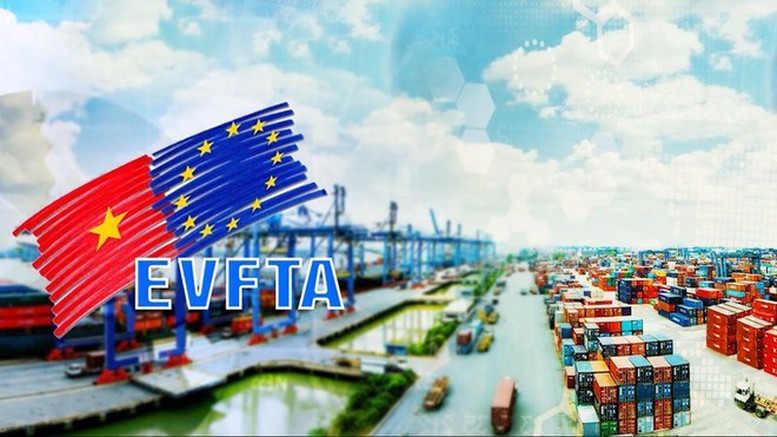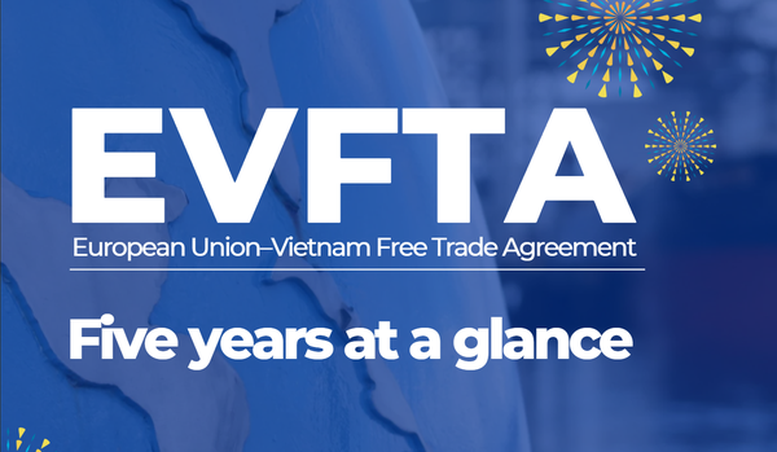
EVFTA: Unleashing Market Expansion and Standard Integration
According to the European Chamber of Commerce in Vietnam (EuroCham), the Free Trade Agreement between Vietnam and the European Union (EVFTA) took effect on August 1, 2020, and is one of the most comprehensive agreements the EU has ever signed with a developing country. Five years into its implementation, EVFTA has boosted bilateral trade to $298 billion as of May 2025, accounting for nearly 40% of the total trade value between the two sides over the past three decades.
At the same time, EVFTA has propelled Vietnam to become the EU’s largest trading partner in ASEAN and 16th globally. Key export categories from Vietnam to the EU include electronics, textiles, furniture, and agricultural products. Conversely, the EU is Vietnam’s third-largest export market and fourth-largest import source, offering strategic products such as machinery, green technology, pharmaceuticals, and transportation vehicles.
Beyond the elimination of over 70% of tariffs upon entry into force, EVFTA pledges to abolish 99% of tariffs in the long run. The agreement also supports businesses in market expansion, enhances intellectual property protection, improves legal transparency, and facilitates bilateral trade.
Bruno Jaspaert, President of EuroCham, emphasizes that in the face of mounting trade barriers and protectionist tendencies, EVFTA stands as a symbol of cooperation and trust between economies. He underscores that transparent standards, open markets, and legal harmony are fundamental to fostering sustainable development.
EuroCham’s second-quarter 2025 Business Climate Index (BCI) reveals that 66% of businesses are actively trading under EVFTA, with nearly 100% possessing a certain understanding of the agreement. Notably, 50% of these businesses acknowledge moderate to significant benefits, with an average net profit increase of 8.7%, and some businesses reaching 25%.
Businesses not only anticipate tariff preferences but also stand to gain from accessing Vietnam’s rapidly growing domestic market, especially in areas like sustainable agriculture, digital transformation, and renewable energy.

EuroCham’s second-quarter 2025 Business Climate Index (BCI) reveals that 66% of businesses are actively trading under EVFTA, with nearly 100% possessing a certain understanding of the agreement.
Effective Implementation and Reform: The Key to Maximizing EVFTA
One significant challenge in the EVFTA implementation process pertains to Rules of Origin regulations, which are mandatory for enjoying tariff preferences. Many Vietnamese businesses remain reliant on imported raw materials and components from third countries, making it challenging to prove legitimate origin.
While EVFTA permits the accumulation of origin from several countries, the documentation process remains complex. Approximately 37% of businesses encounter frequent discrepancies in customs valuation, leading to increased costs and reduced competitiveness. Moreover, a lack of alignment among relevant authorities poses a considerable barrier.
Jean-Jacques Bouflet, Vice President of EuroCham and former EVFTA negotiator, believes that the agreement’s provisions are designed for optimal efficiency and inclusivity. However, implementation is a lengthy process that necessitates continuous adjustments and a business-centric mindset.
Currently, Certificates of Origin (C/O) are considered a vital tool for businesses to leverage tariff preferences. In 2024, Vietnam issued over 1.8 million preferential C/Os, with total export value surpassing $100 billion. Exports to the EU alone reached an all-time high of $51.7 billion, marking an 18.4% increase compared to the previous year.
Since May 2025, Vietnam has been focusing on centralizing the C/O issuance process and working towards establishing a national digital platform. However, significant variations in processing time, ranging from under 24 hours to over a week, persist. To address this, EuroCham recommends promoting electronic registration and enabling businesses to self-certify origin to reduce costs, save time, and enhance trade efficiency.
Institutional Reform and Strengthened Partnerships
Starting in late 2024, Vietnam embarked on a series of robust structural reforms: merging ministries, sectors, and localities; streamlining 30% of the administrative apparatus; implementing VNeID for business identification; and introducing the country’s first FTA Index in 2025.
The FTA Index, led by the Ministry of Industry and Trade, guides authorities at all levels in effective economic integration, enhances transparency, and strengthens implementation capacity. This foundation is crucial for formulating policies that promote sustainable export development and attract long-term investment.
“We witness a government willing to reform, engage in dialogue, and take concrete actions,” says Bruno Jaspaert, President of EuroCham. “Economic indicators suggest that Vietnam is entering a period of robust growth, in line with the expectations of high-ranking leaders.”
EuroCham continues to engage in dialogue with the Vietnamese government, organizing specialized workshops, dialogues with the Prime Minister, and conveying reform messages to EU agencies in Brussels during the first quarter of 2025.
The EU remains Vietnam’s stable and sustainable economic partner. EuroCham is committed to accompanying Vietnam in its journey towards realizing growth and integration goals. According to EuroCham, reforming customs procedures, simplifying administrative processes, and enhancing policy implementation effectiveness are essential steps to ensure EVFTA maximizes its potential.
In a dynamic international context, EVFTA is one of 17 FTAs that Vietnam has signed, reinforcing the country’s central role in the global trade network. Simultaneously, the EU-Vietnam Investment Protection Agreement (EVIPA) awaits ratification by a few EU member states.
Once in force, EVIPA will establish a legal framework to safeguard and promote high-quality investment flows from Europe to Vietnam. Furthermore, the potential upgrade of relations to a “Comprehensive Strategic Partnership” between the EU and Vietnam is expected to be advanced in the near future.
EuroCham’s White Book 2025 also emphasizes that sustainable cooperation necessitates institutionalized reforms, particularly in administrative simplification, improving legal consistency, and enhancing implementation effectiveness. Thus, EVFTA is not merely a trade agreement but a catalyst for long-term reform.
“Ho Chi Minh City: Upholding the Spirit of ‘Leading the Way in 5 Areas’”
Prime Minister Pham Minh Chinh has urged Ho Chi Minh City to uphold the spirit of “5 pioneering initiatives” in innovation, high-quality human resources, and social welfare.
“Finalizing Staff Benefits: Supporting Affected Personnel Post-Restructuring”
“Vietnam’s top decision-making bodies, the Politburo and the Secretariat, have issued a directive to promptly address and finalize the benefits and entitlements of officials impacted by the recent organizational restructuring. These bodies have set a deadline of August 31st, emphasizing the urgency and importance of resolving these matters without delay.”












































